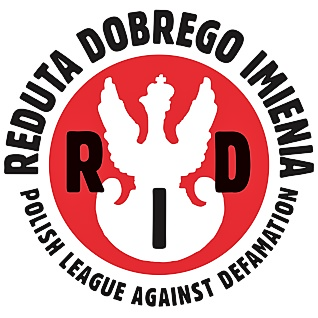The authors of the book Night Without an End (Dalej jest noc) present false information about a Polish hero – Edward Malinowski – who hid Jews during the Second World War. In their book, Barbara Engelking and Jan Grabowski refer to him as being an accomplice in the murder of Jews. The Good Name Redoubt is defending the good name of Edward Malinowski, supporting his niece in a lawsuit against the authors, and providing legal assistance.
In fragments of Night Without an End, Edward Malinowski, who was Filomena Leszczyńska’s paternal uncle, is depicted as “an accomplice in the murder of several dozen Jews who were hiding in the forest, and were handed over to Germans.” This version of history presented in Grabowski and Engelking’s publication is false, and such a depiction constitutes an infringement of the personal interests of not just Ms Leszczyńska, but also of every Pole.
Edward Malinowski, who is described in the defendants’ publication, hid Jewish people during the Second World War. One day in 1943, Germans looking for Jews hidden in nearby forest shelters came to the village of which he was leader. They demanded that the gamekeeper from Czerna (a nearby village) be brought out, and, as soon as he arrived, they set out for the woods, along with the village leader Malinowski, and several others. The peasants who accompanied them were told to bring shovels. Once there, the Germans used information from the gamekeeper to find the shelter, and they killed the Jews who were hiding there. After the war, Edward Malinowski was denounced by a neighbour, arrested by the Department of Security (UB), and accused of killing Jews. He was acquitted following a trial which included testimonies from the Jews he had hidden.
Describing the fate of one of the Jewish women hidden by Edward Malinowski, Barbara Engelking writes in Night Without an End that he was “an accomplice in the murder of several dozen Jews who were hiding in the forest, and were handed over to Germans.” At the same time, in a footnote to this fragment presenting her sources, the author provides a quote from the records of the proceedings against Malinowski conducted in 1950, in which she omits the fact that Malinowski had been hiding the Jewish woman and giving her food without taking anything in return.
It should be pointed out that the public and state-owned materials cited by the defendants as sources of information are quoted selectively. The rest of the passage regarding Edward Malinowski was concocted from false allegations, and from events which never happened. In particular, Barbara Engelking untruthfully writes that the Jew Maria Wiśniewska (then Estera Drogicka) was robbed by Edward Malinowski, and that she knew that he was an accomplice in the killing of 18 Jews. It is also not true that Ms Wiśniewska falsely testified at the trial to secure Malinowski’s acquittal.
According to the then-residents of the village, Edward Malinowski was a good village leader, who defended the residents, and never collaborated with German soldiers.
“The purpose of this lawsuit is to protect the memory of Edward Malinowski, who defended Jews during the war. He was a hero, and should be remembered as such by his niece, by their friends, and by all Poles. In my opinion, the events presented in Night Without an End are simply made up. This scandalous behaviour by the authors serves the purpose of confirming their thesis that Poles were killing Jews. In their publication, Grabowski and Engelking dishonours Edward Malinowski’s name by de facto calling him a thief and a murderer. There is no doubt that Malinowski was a hero, and we are going to prove this in court,” said Maciej Świrski, President of the Good Name Redoubt.
Filomena Leszczyńska, with support from the Good Name Redoubt, is demanding that the defendants remedy the infringement of her personal interests by making public declarations, publishing Maria Wiśniewska’s true testimonies, and paying compensation of PLN 100,000. The Good Name Redoubt is paying the costs of the case (legal representation and court fees, administrative fees, expert-witness fees and historians’ fees).
